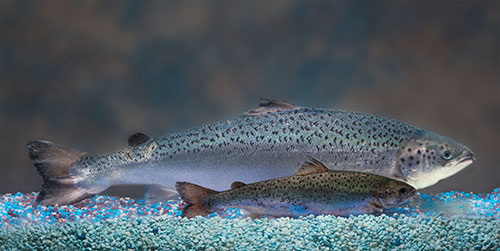
FDA’s Decision Allows GE Salmon to Enter U.S.By MARY KAUFFMAN
March 10, 2019
In response to the FDA deactivating a 2016 import alert that prevented Genetically Engineered (GE) salmon from entering the U.S. market, U.S. Senator Lisa Murkowski (R-AK) said in a prepared statement, “I’m extremely disappointed in the FDA’s short-sighted decision. It is wrong-headed and a bad idea, simple as that. I am not going to back down and will continue my fight to ensure that any salmon product that is genetically engineered be clearly labeled.”
Senator Murkowski wrote, “USDA’s new guidelines don’t require adequate mandatory labeling and don’t suffice as giving consumers clear information. Instead, they will only confuse people. I continue to have serious concerns about splicing DNA from two animals to produce a new marketable fish, essentially creating a new species. American consumers deserve to know what they purchasing, and ultimately eating.” In 2016, Congress directed the FDA not to allow into commerce any food that contains GE salmon until it issued final labeling guidelines for informing consumers of the GE salmon content in the food. Gottlieb said the FDA complied with this requirement by implementing an import alert in 2016 that prevented GE salmon from entering the U.S. With Congress’ enactment of the National Bioengineered Food Disclosure Standard, the U.S. Department of Agriculture (USDA) was charged with implementing a mandatory standard for disclosing whether a food is “bioengineered” and FDA was divested of its authority over voluntary labeling to indicate the presence of GE content in human foods. The FDA no longer has the authority to issue labeling guidance on this topic; however, the FDA believes this Congressional mandate has been satisfied by the USDA’s issuance of final regulations implementing that law in late 2018 because the law and regulations require that human food containing GE salmon bear labeling indicating that it is bioengineered. Therefore, the FDA is deactivating the import alert that prevented food from AquAdvantage Salmon, including salmon eggs used to grow the fish, from entering the U.S. With the deactivation last week of the import alert by the FDA, AquAdvantage Salmon eggs can now be imported to the company’s contained grow-out facility in Indiana to be raised into salmon for food. As was determined during the FDA’s 2015 review, this fish is safe to eat, the genetic construct added to the fish’s genome is safe for the animal, and the manufacturer’s claim that it reaches a growth marker important to the aquaculture industry more rapidly than its non-GE farm-raised Atlantic salmon counterpart is confirmed. Additionally, as part of its approval, the FDA also analyzed the potential environmental impact that an approval of the AquAdvantage Salmon application would have on the U.S. environment and published its final Environmental Assessment and Finding of No Significant Impact in November 2015. Based on the multiple forms of physical and biological environmental containment measures proposed by the company in its application, the FDA found that an approval of the application related to AquAdvantage Salmon would not cause a significant impact on the U.S. environment. Subsequently, the FDA found that multiple forms of containment proposed in the supplemental application to raise the salmon in the company’s Indiana facility also would have no significant impact on the environment. Executive Director of United Fishermen of Alaska Frances Leach also released a prepared statement in opposition of the FDA’s decision to aAllow GE salmon to ente rthe U.S. without clear labeling. Leach wrote, "For over a century, Alaska fishermen have prided themselves on sustainably harvesting wild salmon from Alaska’s clear, pristine waters. We are proud of our legacy of providing families across the nation with delicious, healthy salmon, and consumers have come to associate high quality with Alaska wild salmon. For the FDA to lift an import ban on “frankenfish” without requiring clear labeling to show that these products are genetically engineered is a disservice to consumers and a blow to Alaska’s hardworking fishing communities. We strongly support the efforts of our Congressional delegation to ensure that GE salmon is clearly labeled; giving Americans the information they need to make informed decisions about the seafood they purchase to feed their families." This Congress, Senator Murkowski introduced the Genetically Engineered Salmon Labeling Act to ensure that any GE salmon products in the U.S. market are clearly labeled “genetically engineered” in the market name. In December 2015, Murkowski successfully inserted a provision in the omnibus appropriations bill that blocked the FDA from introducing GE salmon into the market until it publishes labeling guidelines so consumers are aware of what is contained in the product they are purchasing. One month later, in direct response to Senator Murkowski’s efforts, the FDA announced an import ban on GE salmon until labeling guidelines had been published. Fast forward to December 2018, the USDA published labeling guidelines for genetically engineered foods including GE salmon. According to Murkowski, these guidelines don’t require mandatory labeling of GE salmon, and instead allow producers to use QR codes or 1-800 numbers for more information. Regardless, these guidelines led to the FDA’s decision to deactivate the import ban. AquaBounty Technologies, is based in Maynard, Massachusetts developed the fish. The fish, a variety of Atlantic salmon (Salmo salar), is engineered to grow faster than its non-genetically modified counterpart, reaching market size in roughly half the time - about 18 months.
Source of News:
|
||||
